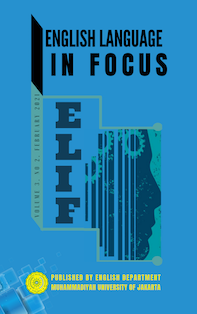A Need Analysis on the Instructional Material Development of Speaking Skills for Secretarial Students
DOI:
https://doi.org/10.24853/elif.3.2.127-134Keywords:
Need Analysis, Necessities, Lacks, Wants.Abstract
A professional secretary should be proficient in English communication, particularly in productive skills such as speaking and writing, to complete all of his duties. The research was aimed to determine the needs of the secretarial students in terms of speaking skills to meet the need for professional secretaries in today's business and industrial field. From March to August 2020, 30 secretarial students and 5 professional secretaries from Jakarta participated in this qualitative study. The research’s data was the students' needs that could be divided into target needs (necessities, lacks, wants) and learning needs based on Hutchinson and Waters's theory. The data was collected through observation, interviews, and questionnaires. The findings of the study indicated that the students should master the speaking skill needed to complete the secretarial tasks such a handling phone calls, facing a job interview, describing a product, making an appointment, making a hotel reservation, making a press release, running a business meeting, giving a presentation, winning a negotiation and many more. However, the students encountered a variety of speaking obstacles, including limited vocabulary and incorrect grammar. Furthermore, the students wanted to get a lot of interesting interactive materials that were wrapped in dialogues or monologues activities when learning to speak.References
Abdullah. (2016). Group Work Activities for Improving Speaking Skills. English Education Journal, 7(3), 389–401. http://jurnal.unsyiah.ac.id/EEJ/article/view/4591
Albahlal, F. S. (2019). The Impact of YouTube on Improving Secondary School Students’ Speaking Skills: English Language Teachers’ Perspectives. Journal of Applied Linguistics and Language Research, 6(2), 1–17. http://www.jallr.com/~jallrir/index.php/JALLR/article/view/971
Ali, H. I. H., & Salih, A. R. A. (2013). Perceived Views of Language Teachers on the Use of Needs Analysis in ESP Materials Writing. English Language Teaching, 6(3), 11–19. https://doi.org/10.5539/elt.v6n3p11
Altun, M. (2015). Using Role-Play Activities to Develop Speaking Skills: A Case Study in the Language Classroom. International Journal of Social Sciences & Educational Studies, 1(4), 27–33.
Bansa, Y. A., & Salien, A. W. (2019). A Need Analysis of Applying An English for Secretary Administration Skill and One Year Program in Indonesia Education Institute. Jambi-English Language Teaching, 4(2), 58–73. https://online-journal.unja.ac.id/jelt/index
Chostelidou, D. (2010). A needs Analysis Approach to ESP Syllabus Design in Greek Tertiary Education: A Descriptive Account of Students’ Needs. Procedia - Social and Behavioral Sciences, 2(2), 4507–4512. https://doi.org/10.1016/j.sbspro.2010.03.721
Hartiti, H. M. G., & Haryono, T. (2003). Menjadi Sekretaris Profesional. Jakarta: PPM.
Hutchinson, T., & Waters, A. (1989). English for Specific Purposes : A Learning-Centred Approach. Cambridge University Press.
Karsono, P. (2014). Using Pictures in Improving the Speaking Ability of the Grade Eight-A Students of SMP Negeri 1 Anggana. Dinamika Ilmu: Jurnal Pendidikan, 14(2), 190–213. https://doi.org/10.21093/DI.V14I2.3
Nunan, D. (2004). Task-Based Language Teaching (1st ed.). Cambridge University Press.
Oradee, T. (2012). Developing Speaking Skills Using Three Communicative Activities (Discussion, Problem-Solving, and RolePlaying). International Journal of Social Science and Humanity, 2(6), 533–535. https://doi.org/10.7763/IJSSH.2012.V2.164
Pavlikova, K. (2019). Use of Monologues, Games and Problem Solving Activities For Development of Speaking Skills. Educational Role of Language Journal, 1(1), 83–92. https://doi.org/10.36534/erlj.2019.01.08
Rizqiningsih, S., & Hadi, M. S. (2019). Multiple Intelligences (MI) on Developing Speaking Skills. English Language in Focus (ELIF), 1(2), 127-136. https://doi.org/10.24853/elif.1.2.127-136
Robinett, B. W., Hutchinson, T., & Waters, A. (1988). English for Specific Purposes: A Learning-Centred Approach. The Modern Language Journal, 72(1), 74. https://doi.org/10.2307/327576
Serafini, E. J., Lake, J. B., & Long, M. H. (2015). Needs Analysis for Specialized Learner Populations: Essential Methodological Improvements. English for Specific Purposes, 40, 11–26. https://doi.org/10.1016/j.esp.2015.05.002
Silviyanti, T. M. (2014). Looking into EFL Students’ Perceptions in Listening by Using English Movie Videos on YouTube. Studies in English Language and Education, 1(1), 42–58. https://doi.org/10.24815/siele.v1i1.1119
Yatimah, D. (2009). Sekretaris Modern. Jakarta: Eska Media.
Downloads
Published
Issue
Section
License
Authors who publish with this journal agree to the following terms:
- Authors retain copyright and grant the journal right of first publication with the work simultaneously licensed under a Creative Commons Attribution License that allows others to share the work with an acknowledgment of the work's authorship and initial publication in this journal.
- Authors can enter into separate, additional contractual arrangements for the non-exclusive distribution of the journal's published version of the work (e.g., post it to an institutional repository or publish it in a book), with an acknowledgment of its initial publication in this journal.
- Authors are permitted and encouraged to post their work online (e.g., in institutional repositories or on their website) before and during the submission process, as it can lead to productive exchanges, as well as earlier and greater citation of published work (See The Effect of Open Access).


